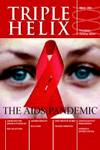Dr Liz Walker - GP retainer in Farnborough and former CMF chairman - presents us with this sticky dilemma:
Frank, a rather anxious 59 year old, consulted your partner with tiredness and difficulty in walking.He had bilateral leg fasciculation and minimal right foot weakness.Pressed for the 'worst case scenario', your colleague mentioned motor neurone disease (MND) as a rare possibility and referred him to a neurologist. A week later, you are called out to see Frank: he's having a panic attack and is convinced he can't breathe because ofMND. It turns out that his best friend died of the same condition.Frank's son tells you that he is going to make a formal complaint against your partner for mentioning the possibility 'without proof '. How would you handle this situation? What would you have done in your partner's shoes?
Malcolm Savage is on the Sheffield GP training scheme and a former CMF staffworker:
Resolving this situation would require competence, compassion and communication. Wisdom from the book of Proverbs is helpful: 'It is not good to have zeal without knowledge, nor to be hasty and miss the way'.[1] I wouldn't diagnose a panic attack before excluding other pathology such as a myocardial infarction. I would take a history and examine Frank. Treating him professionally would help him trust me - vital as panic attacks require reassurance!
I would choose my words carefully: 'Reckless words pierce like a sword, but the tongue of the wise brings healing'.[2] Frank wants to hear that he hasn't got MND but these would be reckless words from me. 'A cheerful look brings joy to the heart, and good news gives health to the bones.'[3] So, whilst acknowledging the worry of the possibility of MND, I would emphasise the good news: 'Frank, you're having a panic attack, not dying of a disease you may not have!'
I might find it difficult to prioritise helping Frank as opposed to trying to avert a complaint. 'Meddling in someone else's quarrel is like seizing a dog by the ears.'[4] I could avoid the issue, suggesting that Frank's son make an appointment to see my colleague. However, 'A patient man calms a quarrel'.[5] Given enough time and sensitively using all the communication skills I know, I may be able to defuse the situation. Most complaints could have been avoided by clearer doctor-patient communication. There are several useful questions my colleague could have asked: 'What do you think or fear may be going on?' and 'What would you like to ask?' He could then have tailored his response to Frank's worries and queries. Of course, once Frank's diagnosis is made, he has the right to be told. At this early stage, it may have been wisest to refuse to speculate on specific illnesses.
John Geater was a GP in Hastings and is now Director of PRIME:
When I was in medical school nearly forty years ago, the debate was raging over a patient's right to know. Even today, openness is not a universal medical standard. One overseas colleague told me: 'If you tell a patient they are dying, you take away the life that remains'.
However, patients' right to know bad news is now virtually enshrined in the NHS. Whether they should be told of every medical possibility is a different matter. We rarely give medication as a single bolus but feed it in sequentially. Information is a powerful drug that should be titrated against Frank's need and ability to assimilate it. This interesting differential diagnosis has spelt out a death sentence to Frank.
When a patient presses for a worse case scenario, he has often spent hours pondering about it or even surfing the net. A patient's rational conclusion may even help us towards a correct diagnosis. However, we should be ready to allay fears caused by unfounded conclusions. In retrospect, my colleague should have reflected Frank's question back and asked him what he thought may be going on. Frank may then have raised the MND possibility himself, allowing proper discussion. Instead, he simply heard the disease on my colleague's lips and seized upon it as confirmation of his fears.
The mention of litigation drives some doctors to sleepless nights and others to confrontational aggression. Neither reaction is helpful: Frank is a man in physical and spiritual distress, not our enemy. Leaping in to defend my partner may not help as my perceived alliance at this could harden Frank's son's attitude. I would tell him that neither he nor I was present at the consultation and so don't know exactly what was said. Of course, I would inform my colleague: no doubt he would try to put things right. Meantime, I would reassure Frank that his breathlessness was not due to advanced MND.
If MND is confirmed, Frank will need an intact doctor-patient relationship more than ever. Before seeing my next patient, I would offer a prayer to God 'the author of peace and lover of concord'.
































